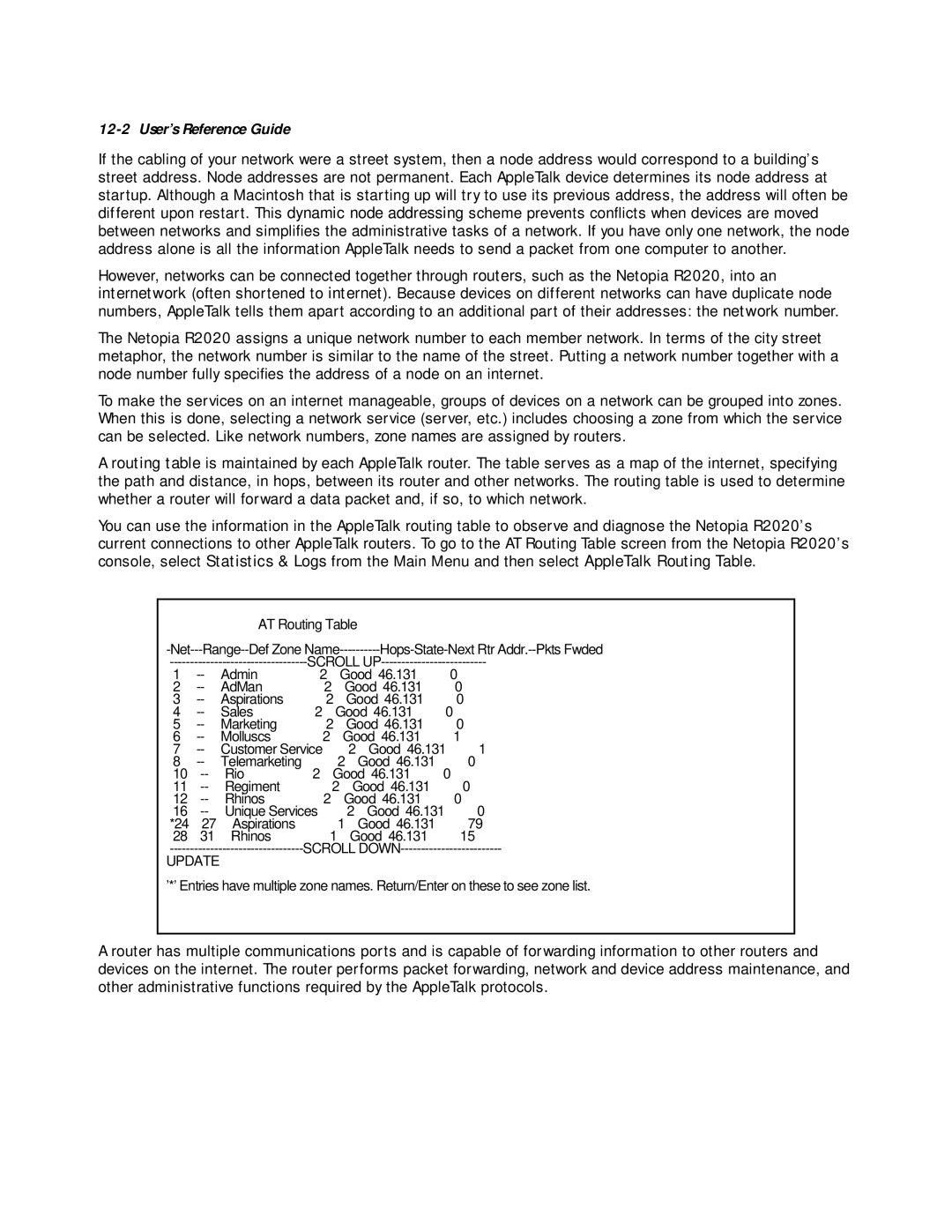
12-2 User’s Reference Guide
If the cabling of your network were a street system, then a node address would correspond to a building’s street address. Node addresses are not permanent. Each AppleTalk device determines its node address at startup. Although a Macintosh that is starting up will try to use its previous address, the address will often be different upon restart. This dynamic node addressing scheme prevents conflicts when devices are moved between networks and simplifies the administrative tasks of a network. If you have only one network, the node address alone is all the information AppleTalk needs to send a packet from one computer to another.
However, networks can be connected together through routers, such as the Netopia R2020, into an internetwork (often shortened to internet). Because devices on different networks can have duplicate node numbers, AppleTalk tells them apart according to an additional part of their addresses: the network number.
The Netopia R2020 assigns a unique network number to each member network. In terms of the city street metaphor, the network number is similar to the name of the street. Putting a network number together with a node number fully specifies the address of a node on an internet.
To make the services on an internet manageable, groups of devices on a network can be grouped into zones. When this is done, selecting a network service (server, etc.) includes choosing a zone from which the service can be selected. Like network numbers, zone names are assigned by routers.
A routing table is maintained by each AppleTalk router. The table serves as a map of the internet, specifying the path and distance, in hops, between its router and other networks. The routing table is used to determine whether a router will forward a data packet and, if so, to which network.
You can use the information in the AppleTalk routing table to observe and diagnose the Netopia R2020’s current connections to other AppleTalk routers. To go to the AT Routing Table screen from the Netopia R2020’s console, select Statistics & Logs from the Main Menu and then select AppleTalk Routing Table.
|
| AT Routing Table |
|
| ||
Def Zone | Pkts Fwded | |||||
| SCROLL |
| ||||
1 | Admin | 2 | Good | 46.131 | 0 | |
2 | AdMan | 2 | Good | 46.131 | 0 | |
3 | Aspirations | 2 | Good | 46.131 | 0 | |
4 | Sales | 2 | Good | 46.131 | 0 | |
5 | Marketing | 2 | Good | 46.131 | 0 | |
6 | Molluscs | 2 | Good | 46.131 | 1 | |
7 | Customer Service | 2 | Good | 46.131 | 1 | |
8 | Telemarketing | 2 | Good | 46.131 | 0 | |
10 | Rio | 2 | Good | 46.131 | 0 | |
11 | Regiment | 2 | Good | 46.131 | 0 | |
12 | Rhinos | 2 | Good | 46.131 | 0 | |
16 | Unique Services | 2 | Good | 46.131 | 0 | |
*24 | 27 | Aspirations | 1 | Good | 46.131 | 79 |
28 | 31 | Rhinos | 1 | Good | 46.131 | 15 |
| SCROLL |
| ||||
|
|
|
|
| ||
'*' Entries have multiple zone names. Return/Enter on these to see zone list.
A router has multiple communications ports and is capable of forwarding information to other routers and devices on the internet. The router performs packet forwarding, network and device address maintenance, and other administrative functions required by the AppleTalk protocols.
